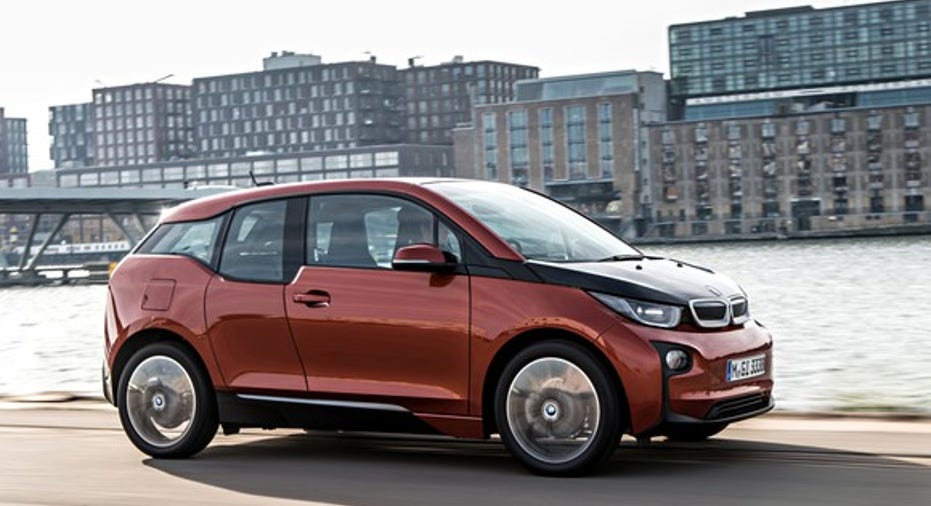How Samsung Is Moving to Become a Major Player in Electric Cars

Samsung currently ships the batteries for BMW's i3 to Germany from South Korea. It said that it will build a battery factory in Hungary that will open in 2018. Image source: BMW.
South Korean giant Samsung Group (NASDAQOTH: SSNLF) said it will spend about $358 million to build a factory in Hungary that will make battery cells for electric vehicles. It's the latest in a series of moves that suggest Samsung is intent on becoming a big player in the auto industry's ongoingtransformation.
A new battery factory in Europe
The Group's Samsung SDI unit said it will spend about 400 billion won ($358 million) to build a battery-cell factory at a site near Budapest. The factory is expected to start production in the second half of 2018, and the company said it will be able to produce batteries for up to 50,000 pure battery-electric vehicles (or a larger number of plug-in hybrids) per year.
Samsung SDI's current customers include BMW (NASDAQOTH: BAMXF). Samsung currently makes the batteries for BMW's i3 at a plant in South Korea and ships them to Leipzig, Germany, where the i3 is assembled. That's fine for a small-volume program, but as BMW continues to ramp up its electric-car plans, it makes sense for Samsung to have a battery plant closer to BMW's home base.
Samsung is pushing to become a major force in autos
In recent months, Samsung has boosted its efforts to become a major player in the fast-transforming global auto business. Last month, the company spent $449 million to acquire a 4% stake in BYD (NASDAQOTH: BYDDY), the Chinese maker of batteries and vehicles that is partially owned by Berkshire Hathaway. Samsung is also reported to be in talks to buy key auto-industry supplier Magneti Marelli from its current owner, Fiat Chrysler Automobiles.
Samsung is playing catch-up against rivals like LG Chem (NASDAQOTH: LGCLF) and Panasonicin the race to supply the world's automakers with batteries. Tightening environmental rules around the world have most of the major automakers moving aggressively to incorporate hybrid and plug-in technology into their fleets, with a longer-term goal of moving to fully electric propulsion over the next couple of decades.
Right now, Korean rival LG Chem is well ahead
At the moment, LG Chem is well ahead of Samsung. LG Chem supplies batteries and technology to about 25 automakers around the world. It's the key supplier behind General Motors'Chevrolet Bolt EV, set to become the first affordable 200-mile battery-electric car when it goes into production this fall.
Back in April, LG Chem said it will build its own European battery factory in the Polish city of Wroclaw. That factory, expected to open in late 2017, will be significantly larger than Samsung SDI's Hungarian plant, with the ability to make enough batteries for 229,000 fully electric cars a year.
LG Chem's European battery customers include Renault, Volvo Cars, and Volkswagen (NASDAQOTH: VLKAY), as well as VW subsidiary Audi. VW is beginning a massive shift toward plug-in hybrids and fully electric vehicles, with five new electric VWs in development, though it's reportedly considering the idea of building its own battery factory in Germany. Audi is expected to launch an electric luxury SUV with about 300 miles of range in the first half of 2018.
The ground is being laid for a transformation of the auto business
It's clear the auto industry is changing quickly. Sales of plug-in hybrids are expected to grow rapidly over the next decade as air-pollution regulations tighten (and as the technology improves). Many in the industry believe plug-in hybrids will help consumers get used to the idea of electric cars, smoothing the transition to a fully electric vehicular future.
Obviously, the auto industry's supply chains will have to evolve to keep up with this transformation. It's still very early days, but it's clear that Samsung is moving now to become a major player in the post-gasoline automotive future.
A secret billion-dollar stock opportunity The world's biggest tech company forgot to show you something, but a few Wall Street analysts and the Fool didn't miss a beat: There's a small company that's powering their brand-new gadgets and the coming revolution in technology. And we think its stock price has nearly unlimited room to run for early, in-the-know investors! To be one of them, just click here.
John Rosevear owns shares of General Motors. The Motley Fool owns shares of and recommends Berkshire Hathaway (B shares). The Motley Fool recommends BMW and General Motors. Try any of our Foolish newsletter services free for 30 days. We Fools may not all hold the same opinions, but we all believe that considering a diverse range of insights makes us better investors. The Motley Fool has a disclosure policy.



















